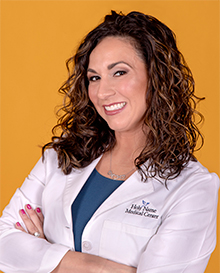Contact Us
A common misconception is that stroke only affects older people. In reality, nearly one in seven strokes now occurs among children and younger adults (under 45)...and that number is rising.
The reason – a significant increase in obesity-related risk factors among young people, including high blood pressure, high cholesterol, and diabetes. Other unhealthy behaviors like smoking, drug use, and a lack of physical activity can further increase the risk of a stroke for anyone, at any age.
"A stroke occurs when brain cells are deprived of oxygen and die, either from a clot that obstructs a blood vessel to the brain or from bleeding and swelling from a rupture in a blood vessel in the brain. Both types of strokes can affect speech, memory, and/or muscle control," says Holy Name neurologist Dr. Marissa Oller. "Minimizing risk factors for stroke and knowing how to tell when a stroke is occuring can play an important part in protecting your health or even saving someone’s life."
What you need to know about stroke
True or False: There Are No Warning Signs Prior to a Stroke.
True. In fact, the reason it is called a stroke is because it happens so quickly. For some people, a temporary blockage of blood flow to the brain – called a transient ischemic attack, or TIA – may occur and should not be ignored. A TIA vastly increases the chance of a full stroke.
True or False: It's Hard to Tell When Someone Is Having a Stroke.
False. The signs and symptoms are easy to detect. Think of the acronym BE-FAST:
- Balance loss
- Eye trouble in one or both eyes
- Face drooping
- Arm or leg weakness
- Speech difficulties
- Time to call 911; every second counts!
True or False: Stress Can Cause a Stroke.
True. Stress can lead to high blood pressure, a major risk factor. Try stress-reduction techniques, such as meditation, yoga, massage, or mindfulness.
True or False: There's Nothing I Can Do to Prevent a Stroke.
False. There is a lot you can do: Maintain an appropriate weight. Eat a healthy diet. Stop smoking, drinking excessive alcohol, and using heavy drugs. Exercise and see your doctor regularly.
No matter what your age, take some time to learn more about strokes. You never know when a loved one, co-worker, or even you will suffer a stroke.
"When it comes to stroke," says Dr. Oller, "knowledge is power."
Holy Name is designated a Primary Stroke Center by The Joint Commission and has earned the highest award for stroke care – Elite Plus/Gold Plus – from the American Heart Association/American Stroke Association. Holy Name’s acute stroke team immediately evaluates a patient through a standard diagnostic protocol of tests. If appropriate, a clot-busting medication or mechanical intervention is administered to help prevent permanent disabilities. For more about the Stroke Center, click here.


